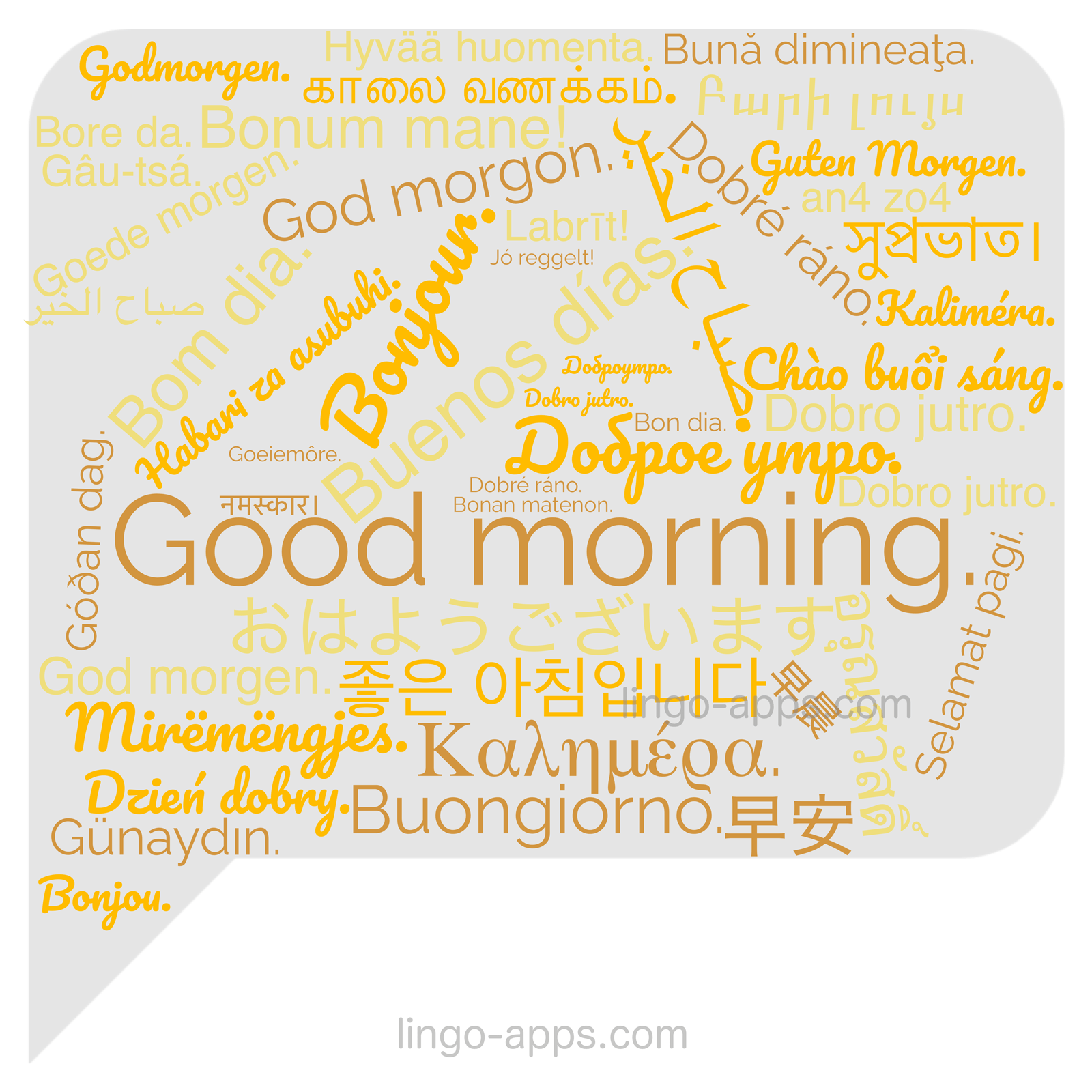Good Morning In All Languages: A Comprehensive Guide

Good morning is a universal greeting that transcends cultures and languages, connecting people across the globe. In a world that is increasingly interconnected, understanding how to say "good morning" in various languages can enhance your communication and cultural appreciation. This article explores how to greet someone in the morning in many different languages, along with the cultural significance behind these greetings.
Whether you are a traveler looking to connect with locals or simply interested in broadening your linguistic knowledge, knowing how to say "good morning" can be both useful and enjoyable. This guide will not only provide you with translations but also delve into the nuances of how these greetings are used in different cultural contexts.
Join us on this linguistic journey as we uncover the ways to say "good morning" around the world. From the charming phrases of Europe to the melodic greetings of Asia, this article will serve as your go-to resource for morning salutations in multiple languages.
Table of Contents
1. Importance of Morning Greetings
Greeting someone in the morning is more than just a polite gesture. It sets the tone for the rest of the day and can foster a sense of community and connection. Morning greetings can vary significantly across cultures, reflecting local customs, traditions, and social norms.
Studies have shown that positive social interactions in the morning can enhance mood and productivity throughout the day. By learning how to say "good morning" in different languages, you can create a positive atmosphere and show respect for other cultures.
2. Good Morning in European Languages
Europe is a continent rich in languages and cultures. Here are some ways to say "good morning" in various European languages:
- English: Good Morning
- French: Bonjour
- German: Guten Morgen
- Spanish: Buenos Días
- Italian: Buongiorno
- Portuguese: Bom Dia
- Dutch: Goedemorgen
Understanding European Morning Greetings
In many European countries, morning greetings are often accompanied by a friendly smile and eye contact. For instance, in France, "Bonjour" is not just a way to say good morning; it’s also a way to acknowledge the other person's presence and initiate conversation.
3. Good Morning in Asian Languages
Asia is home to a diverse range of languages and cultures. Here’s how to say "good morning" in a few Asian languages:
- Chinese (Mandarin): 早上好 (Zǎoshang hǎo)
- Japanese: おはようございます (Ohayō gozaimasu)
- Korean: 좋은 아침입니다 (Joeun achimimnida)
- Hindi: शुभ प्रभात (Shubh prabhat)
- Arabic: صباح الخير (Sabah al-khayr)
The Significance of Morning Greetings in Asia
In many Asian cultures, morning greetings are vital for building relationships. For example, in Japan, the phrase "Ohayō gozaimasu" is a formal greeting that shows respect, especially in professional settings.
4. Good Morning in African Languages
Africa is known for its linguistic diversity. Here are some ways to say "good morning" in various African languages:
- Swahili: Habari ya asubuhi
- Xhosa: Molo
- Zulu: Sawubona
- Amharic: መልካም እንቁላል (Melkam enku lal)
Morning Greetings Across Africa
In African cultures, greetings often serve as a way to inquire about a person's well-being and can take longer than brief exchanges in Western cultures. A simple "Habari ya asubuhi" in Swahili can lead to a more extensive conversation about health and family.
5. Good Morning in American Languages
In the Americas, various languages are spoken. Here’s how to say "good morning" in some of them:
- English: Good Morning
- Spanish: Buenos Días
- Portuguese: Bom Dia
Morning Greetings in North and South America
In North America, morning greetings are typically straightforward, but in Latin American cultures, greetings can be more elaborate and often include inquiries about the other person's family and well-being.
6. Cultural Significance of Morning Greetings
Understanding the cultural significance behind morning greetings can deepen your appreciation for them. In many cultures, greetings are an essential part of social interaction and can reflect values such as respect, community, and kindness.
For example, in some Indigenous cultures in North America, morning greetings may include blessings and well-wishes for the day ahead. This practice emphasizes the importance of connection to nature and community.
7. Fun Facts About Morning Greetings
- In some cultures, it is customary to greet everyone in the room before starting a conversation.
- The way you say "good morning" can vary greatly depending on the time of day and the level of formality required.
- In many cultures, a morning greeting can lead to a longer conversation about well-being and family.
8. Conclusion and Call to Action
In conclusion, knowing how to say "good morning" in various languages not only enhances your communication skills but also fosters a deeper understanding of different cultures. As we have explored, morning greetings carry significant cultural weight and can set a positive tone for the day.
We encourage you to practice these greetings and share them with friends and family. If you found this article helpful, please leave a comment, share it on social media, or explore more articles about languages and cultures on our site.
Thank you for joining us on this linguistic adventure, and we hope to see you back here soon for more exciting insights!
ncG1vNJzZmirn521b6%2FOpmatoJWovKm01qarp52nqIFws86om2aln6e7qrrGZqCnZZGhuW64wKeerpmXmsBvtNOmow%3D%3D